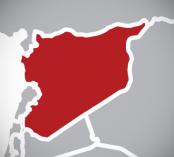
It was April 13, just past noon, and Hasan al-Araj was behind schedule as he left an underground hospital for his next rounds. He was usually careful to check the skies above him in Hama, where he was the last surviving cardiologist in the province’s rebel-held territory, for the Russian and Syrian warplanes that regularly cruised overhead. But, in his haste, he did not use his walkie-talkie to confirm with colleagues that the skies were clear.
A missile exploded near his van as he drove away. In the wreckage, colleagues found body parts and pieces of his white medical coat.
“It was targeting,” said Ahmad al-Dbis, a pharmacist and medical aid worker who worked closely with Araj. “It’s known that that’s the location of a hospital, and it’s known that most of the people moving around there are medical staff.”
Since March 2011, at least 738 Syrian doctors, nurses, and medical aides have died in more than 360 attacks on medical facilities, according to Physicians for Human Rights (PHR). The independent human rights group holds the Syrian government and its ally, Russia, responsible for upwards of 90 percent of these attacks.
Medical aid workers accuse the Syrian government and Russia of seeking to demoralize and drive out civilians and fighters from opposition-held territory by depriving them of health care and battlefield medicine. The targeted attacks on hospitals have certainly depleted the supply of doctors in rebel areas. Earlier in April, a sniper bullet to the head killed the last doctor in the besieged town of Zabadani. Later that month, rebel-held Aleppo lost one of its last pediatricians when a regime airstrike flattened al-Quds Hospital. According to PHR, 95 percent of the medical personnel who were in Aleppo before the war have either fled, been detained, or were killed.
It is a war crime under international law to deliberately target hospitals, doctors, and nurses. In early May, after a series of airstrikes in Aleppo, the U.N. Security Council unanimously passed a resolution condemning what Secretary-General Ban Ki-moon described as “surgical strikes … hitting surgical wards.” But like so many other U.N. declarations about Syria, it had no teeth —there was no risk of punishment for violating the resolution. By the end of that month, two more hospitals were damaged as a result of air raids on rebel-held Idlib and Aleppo.
Araj, who was 46 at the time of his death, accepted the risks of his work. He sent his wife and five children to Turkey for their safety and visited his family there frequently. But he was dead set on remaining in his homeland: “Even if you give me all of Europe, I will not leave my country,” he told an assembly of doctors at a medical conference in Geneva last year, according to Dbis. “I don’t betray my country in these circumstances. And, inshallah, either I will die in Syria or we will triumph.”
The full article continues on the Foreign Policy website at: http://foreignpolicy.com/2016/08/11/the-war-on-syrias-doctors-assad-medicine-underground/.

